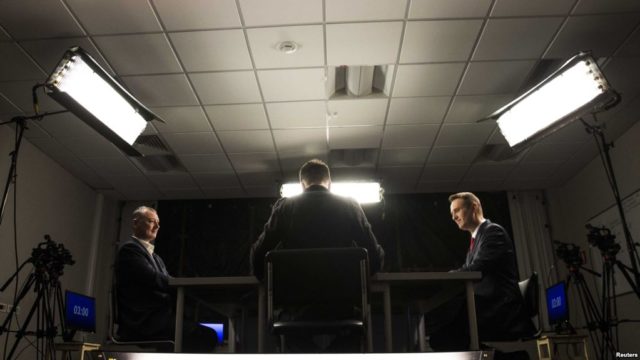
Navalny-Strelkov Debate Inadvertently Highlights Key Similarities Between Alexei Navalny and Vladimir Putin
By:

On Thursday, July 17, at 12:00 p.m., Alexei Navalny, the leader of the opposition to Vladimir Putin and a prospective candidate in the 2018 presidential election, sat down for a debate with Igor Stelkov, the leader of the “Novorossiya” (“New Russia”) social movement and part of the “January 25” committee. The debate, which took place in the studio of Navalny’s Fund Against Corruption organization, was broadcast on the Internet through Navalny’s YouTube channel, NavalnyLIVE, as well as a broadcaster aligned with Strelkov (YouTube, July 17). The independent Russian TV station Dozhd and even the news agency Reuters also broadcast this event. Strelkov had challenged Navalny to this debate, and, at the beginning of the video, Navalny declares, “I am on the side of an open political discussion; of course, I am not afraid of a debate.” Journalist Mikhail Tsigarem served as the moderator.
Before the start, each speaker posed three questions to the other. Stelkov’s questions to Navalny were: 1) How does Navalny plan to fight against corruption? 2) What can be done about relations with the West? and 3) What should be done about the situation in Donbas? Navalny’s questions to Strelkov were: 1) Why did Strelkov give a press conference condemning corruption under a portrait of Vladimir Putin, who Navalny called “the godfather of Russian corruption,” and why did Strelkov support the Russian president or refer to him as “the guarantor of freedom and independence of the country?” (2) Why did Strelkov repeat Kremlin anti-Western propaganda? and (3) Why have you, “a [military] officer with an understanding of honor,” been silent about who downed the Boeing 777 (a reference to Malaysian Airlines Flight 17, from Amsterdam to Kuala Lumpur, which was shot down, on June 17, 2014, by a Russian surface-to-air missile, over eastern Ukraine, killing all aboard)?
Strelkov responded to Navalny’s first question by saying that he had not supported Putin for a long time, as he disagreed with the latter’s actions in Chechnya. But when the Kremlin “reunited” Russia with Crimea they “crossed the Rubicon” and he was sure that the next step would be “cleaning up our own [corrupt] environment.” When that failed to happen, his support for Putin declined. Strelkov followed up by charging that Navalny only wanted to make “cosmetic” changes to the oligarchic system established in the 1990s and that he would not change the “base” of the oligarchic system. For his part, Navalny answered that “free courts and honest elections are not cosmetic changes” and that he saw himself as a sincere patriot.
To answer the second question about repeating anti-Western propaganda, Strelkov gave a potted history of how the West had always opposed Russia and was “categorically against the unification of the Russian people [a reference to Crimea].” He went on to state that the boundaries of the “great Russian people” extended to Russia, Little Russia (Ukraine), and Belorussia (Belarus). Perhaps the most interesting part of the debate came in the third round, when Strelkov asked Navalny whether the boundaries of the Russian state were those of the Russian nation. Navalny’s simple answer in the negative led to his defense of his nationalist credentials, which came close to repeating some of the neo-imperialist thinking coming out of the Kremlin. Navalny said the war in Donbas was not (currently) “profitable” and this—not disagreement with its aims—was the reason for his opposition (Newsland.com, July 20).
Overall, the debate was rather tame but highlighted the amount of agreement between the opposition and the government on issues of ethnicity and statehood. More than anything else, it is this agreement and well-established nationalist views that suggest a Navalny government would likely share some key features of the current regime.



